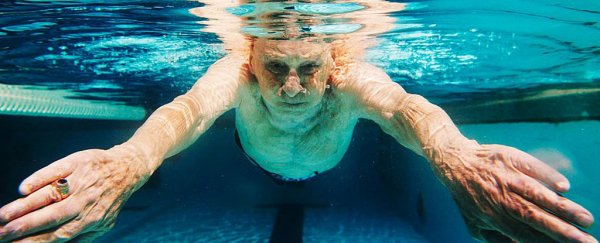For thousands of years, throughout recorded history, people have searched for a way to live longer. And we've made remarkable strides, especially in the past century and a half or so.
But we may now be butting up against a natural limit to the human lifespan, according to an analysis published October 5 in Nature.
The authors of the analysis say that their data indicates that even if we continue to cure diseases that affect people in old age, no one is likely to significantly outlive the Frenchwoman who holds the record of the human with the longest known life, Jeanne Calment.
She was 122 years old when she died, in 1997.
The essential question, according to authors Xiao Dong, Brandon Milholland, and Jan Vijg, is whether or not our maximum lifespan is flexible, like that of some organisms, or whether biological factors mean that limit is fixed.
But while they write that the data they have analysed "strongly suggest that human lifespan has a natural limit", that doesn't mean humanity could never find a way to break that limit.
 Ikaria, a Greek island renowned for the longevity of its residents. Credit: iStock/3quarks
Ikaria, a Greek island renowned for the longevity of its residents. Credit: iStock/3quarks
What the data show
To answer that central question, the authors of the paper analysed demographic data from 41 countries around the globe.
Historically, life expectancy first started to drastically shoot up in the past hundred years or so because we'd eliminated many deaths that occurred early in life.
The introduction of antibiotics, aggressive vaccination campaigns, and measures to reduce infant and maternal mortality ensured that many more people were able to reach old age.
In more recent years, there were slower but significant improvements in late-life mortality, meaning that more and more elderly people lived longer. But those changes appeared to plateau around 1980, the authors write, which they say indicates the possibility of a limit on human life.
To further evaluate this question, the authors analysed the death rates of supercentenarians (people 110 years of age or higher) in the US, the UK, Japan, and France.
Though limited numbers of supercentenarians exist, which means that the data on their death rates is not conclusive, the maximum reported age of death in this group seems to have plateaued as well around 1995 – just two years before the death of Calment.
Even the healthiest people who seem to have the ideal genes for longevity have not lived longer since then. The authors write that the chances of someone living past 125 in any given year are less than 1 in 10,000.
Can we break the limit?
In many ways the essential question right now – among tech billionaires trying to defeat death or among researchers and philosophers convinced we can "slay the dragon" of age – is whether or not humans can outlive whatever natural limits we might have.
The authors of the Nature analysis write that they think the limits on human life are not necessarily set by the diseases that kill us when we're old, but by the processes through which our bodies develop throughout our life.
We need to change and grow and become able to reproduce, but along the way these physical changes set in motion a process that has a natural endpoint.
After that, our cells and bodies are unable to continue. Even curing diseases like cancer and Alzheimer's might not make humans live longer, though the ends of our lives might certainly be better.
For that reason, many of today's current anti-ageing researchers are focused on the idea of improving what's called healthspan as much as they are on improving lifespan. (Who would want to live forever if their bodies and minds continued to decline, like Tithonus of Greek mythology?)
Researchers know that ageing itself is far more complicated and intertwined with humans' basic biology than just being a side effect of the individual diseases that usually end our lives. That highlights the challenge of trying to treat ageing but it also means they understand the complexity of the problem.
"Treating ageing used to be just an idea that was confronted with scepticism," Valter Longo, a professor of gerontology and biological science and the director of the University of Southern California Longevity Institute, told me in a recent interview.
But now Longo believes that there might be enough support for research that helps us figure out how to take the science of life extension further, though he agrees that healthspan must be improved at the same time.
He has developed a diet that he says he thinks could increase average lifespan by about 10 percent (average lifespan still being far less than the lifespan of centenarians but more relevant to a normal person), but that could also keep people much healthier throughout that life.
Jan Vijg, a genetics and ageing researcher and one of the authors of the paper, tells Andrew Joseph and Natalia Bronshtein of Stat News that he doesn't think it's likely we'll figure out how to treat all the intricacies of ageing: "What are you going to do? Develop a drug for all of them?"
And right now, it might be hard to imagine an answer to that.
But 200 years ago it may have been impossible for most people to imagine surviving to 80 years of age or to conceive of the idea that humans would be planning to send people to Mars. Vijg tells Stat that what he thinks is impossible could certainly change.
It's that remarkable challenge that sent Longo and others down the path of trying to 'solve' ageing in the first place.
"It was the most fantastic thing you could possibly study," says Longo. And an eventual answer may reveal ways to exceed even those natural limits we may have.
This article was originally published by Business Insider.
